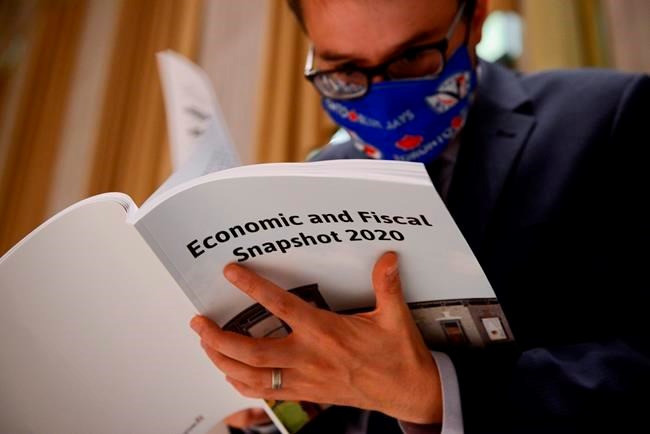OTTAWA — A new poll suggests Canadians are torn on whether the federal government should tighten the taps on COVID-19 spending to keep the deficit from flooding the nation's future.
The Liberals last week revealed this year's projected deficit sits at $343 billion, driven by an estimated $231.9 billion in COVID-19 spending, so far, and a massive drop in government revenue.
With the deficit at levels not seen since the Second World War, Leger and the Association for Canadian Studies asked 1,523 Canadians whether they felt the government ought to immediately and quickly begin to scale back pandemic support programs to Canadians and to business.
Forty-one per cent said yes to that question, 44 per cent said no and 15 per cent said they didn't know or preferred not to answer.
The survey was conducted between July 10 and 12, just after the Liberals released their projections.
It cannot be assigned a margin of error because online polls are not considered truly random.
This week, the Liberal government announced that one of the biggest benefit programs — a federal wage subsidy — will be extended until the end of this year.
It covers 75 per cent of wages, up to a weekly maximum of $847, for eligible companies and non-profits that have lost at least 30 per cent of their revenues.
"Over the last three months you have seen me come out to talk with Canadians about what we're doing to help you and your family, your employer, your local businesses deal with this pandemic," Prime Minister Justin Trudeau said Monday in announcing the extension.
"We're going to continue to do that vital work."
As of July 6, the wage subsidy had paid out $18.01 billion to 252,370 companies. Last week's fiscal and economic update from the Liberals increased the overall budget to $82.3 billion.
The other marquee support program, the Canadian Emergency Response Benefit, is set to expire in the fall.
The $500-a-week benefit had, as of July 5, paid out almost $54.8 billion to 8.25 million people.
Of those surveyed, 78 per cent said they were worried about the size of the deficit and how it may affect things in Canada in the long term.
In releasing the deficit projections, the Liberals didn't set out a plan for how or when they might get the books back to balance.
The survey asked respondents which of two routes traditionally use to cut deficits they would support.
In the survey, 60 per cent said the government ought to focus on cutting government spending, while 21 per cent said the focus should be on raising taxes.
This report by The Canadian Press was first published July 14, 2020.
Stephanie Levitz, The Canadian Press
